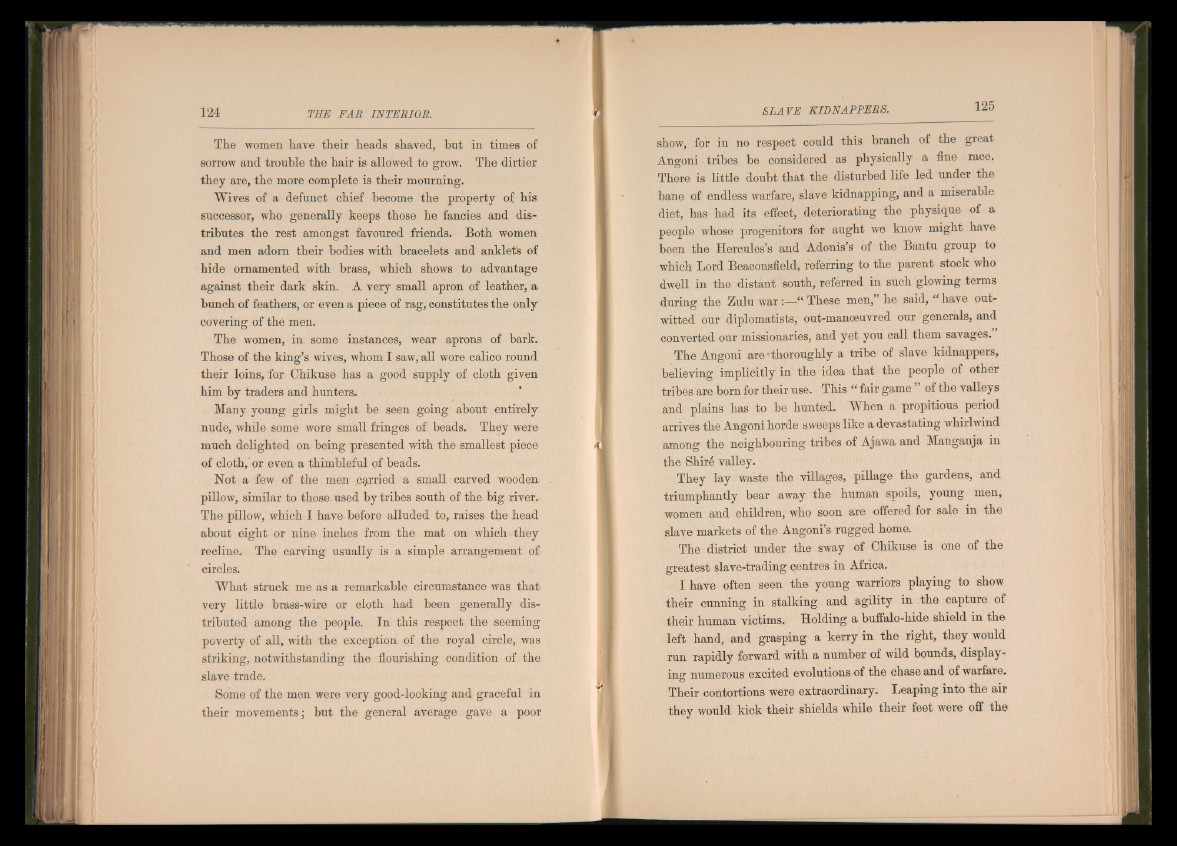
The women have their heads shaved, but in times of
sorrow and trouble the hair is allowed to grow. The dirtier
they are, the more complete is their mourning.
Wives of a defunct chief become the property of his
successor, who generally keeps those he fancies and distributes
the rest amongst favoured friends. Both women
and men adorn their bodies with bracelets and anklet's of
hide ornamented with brass, which shows to advantage
against their dark skin. A very small apron of leather, a
bunch of feathers, or even a piece of rag, constitutes the only
covering of the men.
The women, in some instances, wear aprons of bark.
Those of the king’s wives, whom I saw, all wore calico round
their loins, for Chikuse has a good supply of cloth given
him by traders and hunters.
Many young girls might be seen going about entirely
nude, while some wore small fringes of beads. They were
much delighted on being presented with the smallest piece
of cloth,'or even a thimbleful of beads.
Not a few of the men carried a small carved wooden
pillow, similar to those used by tribes south of the big river.
The pillow, which I have before alluded to, raises the head
about eight or nine inches from the mat on which they
recline. The carving usually is a simple arrangement of
circles.
What struck me as a remarkable circumstance was that
very little brass-wire or cloth had been generally distributed
among the people. In this respect the seeming
poverty of all, with the exception of the royal circle, was
striking, notwithstanding the flourishing condition of the
slave trade.
Some of the men were very good-looking and graceful in
their movements; but the general average gave a poor
show, for in no respect could this branch of the great
Angoni tribes be considered as physically a fine race.
There is little doubt that the disturbed life led under the
bane of endless warfare, slave kidnapping, and a miserable
diet, has had its effect, deteriorating the physique of a
people whose progenitors for aught we know might have
been the Hercules’s and Adonis’S of the Bantu group to
which Lord Beaconsfield, referring to the parent stock who
dwell in the distant south, referred in such glowing terms
during the Zulu war :—“ These men,” he said, “ have outwitted
our diplomatists, out-manoeuvred our generals, and
converted our missionaries, and yet you call them savages.
Thè Angoni are • thoroughly a tribe of slave kidnappers,
believing implicitly in the idea that the people of other
tribes are born for their use. This “ fair game ” of the valleys
and plains has to be hunted. When a propitious period
arrives the Angoni horde sweeps like a devastating whirlwind
among the neighbouring tribes of Ajawa and Manganja in
the Shiré valley.
They lay waste the villages, pillage the gardens, and
triumphantly bear away the human spoils, young men,
women and children, who soon are offered for sale in the
slave markets of the Angoni’s ruggèd home.
The district under the sway of Chikuse is one of the
greatest slave-trading centres in Africa.
I have often seen the young warriors playing to show
their cunning in stalking and agility in the capture of
their human victims,) Holding a buffalo-hide shield in the
left hand, and grasping a kerry in the right, they would
run rapidly forward with a number of wild bounds, displaying
numerous excited evolutions* of the chase and of warfare.
Their contortions were extraordinary. Leaping into the air
they would kick their shields while their feet wère off the